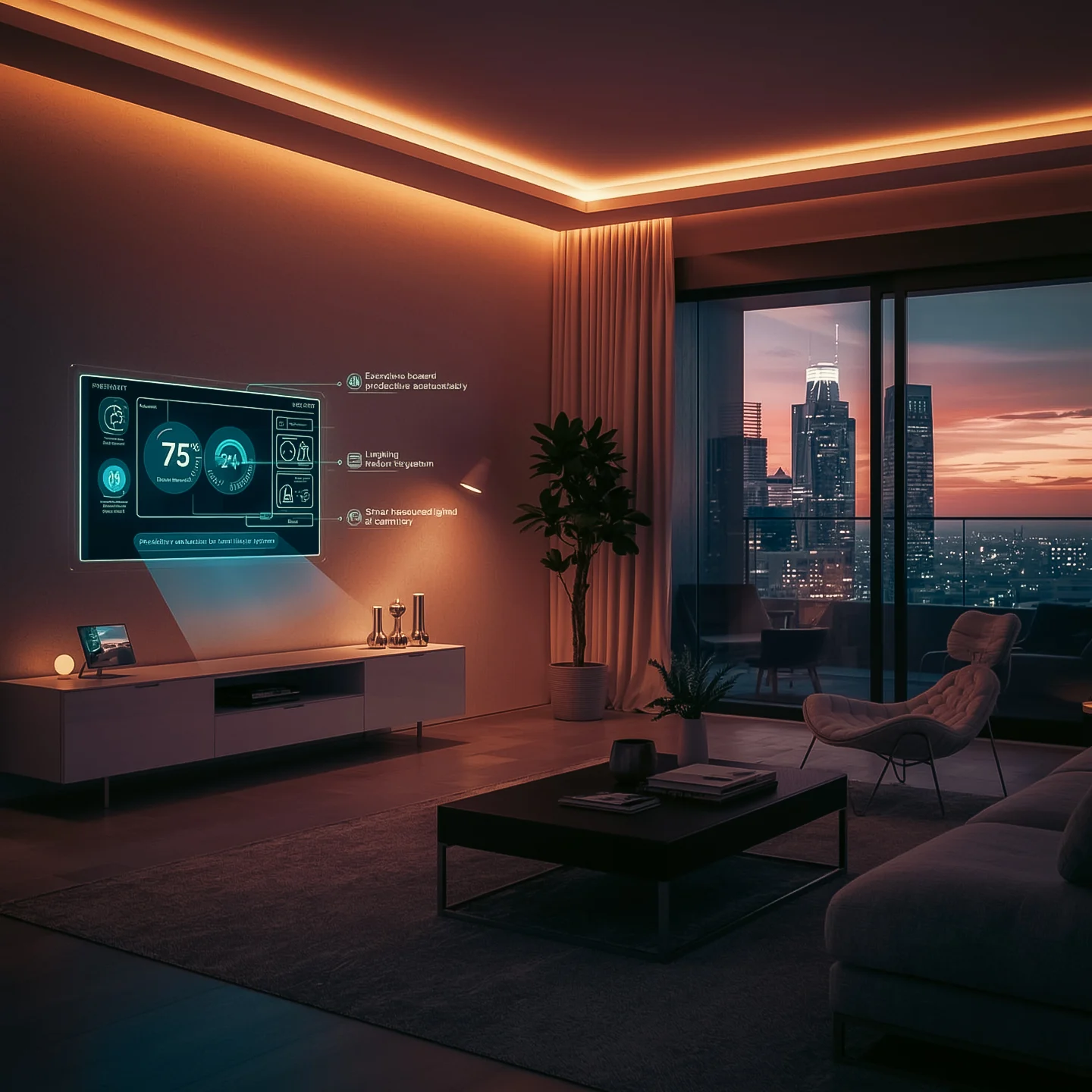
Table of Contents
Key Takeaways
- Smart building automation and IoT are transforming business operations in Africa, delivering enhanced efficiency, sustainability, and cost savings.
- IoT enhances operational efficiency: IoT systems enable real-time data collection and analysis, optimizing operations in sectors like finance, hospitality, manufacturing, and beyond.
- Energy-saving technology reduces costs: Automated HVAC and lighting systems cut utility expenses, promoting sustainable energy use for African businesses.
- Smart hotels enrich guest experiences: IoT integration allows hotels to optimize personalized services such as automated room settings, energy conservation, and seamless check-ins, thereby boosting customer satisfaction.
- Office automation improves workplace productivity: Advanced office systems—including real-time resource tracking, occupancy-based climate controls, and communication platforms—enhance employee performance and operational fluidity.
- Sustainability as a strategic advantage: Commercial automation solutions enable African businesses to meet environmental goals while projecting themselves as eco-conscious leaders in their respective industries.
- Seamless scalability: Smart technologies provide scalable solutions, helping businesses expand efficiently without overcomplicating infrastructure.
- Diverse applications across various sectors: Beyond hospitality and office spaces, industries such as healthcare, retail, and manufacturing are leveraging IoT to streamline workflows and optimize environmental management.
- Faster, informed decision-making: IoT-enabled automation accelerates processes by ensuring data-backed insights and seamlessly connected systems empower leaders to take timely, accurate actions.
Introduction
Smart building automation driven by IoT (Internet of Things) is revolutionizing business landscapes across Africa, creating unprecedented opportunities to improve operations, cut costs, and adopt sustainable practices. In a continent where energy resources are often stretched and operational efficiencies are key to survival, IoT-driven innovation solves critical challenges across industries. But why are these advancements important? Smart automation tools not only promise direct cost reductions but also help organizations align with global trends in sustainability and technological competitiveness. Whether offering personalized amenities to hotel guests or streamlining office workflows, IoT’s impact is far-reaching and transformative. Join us as we explore how IoT-enabled smart building automation is unlocking growth for African businesses, showcasing its diverse applications, tangible benefits, and strategies for overcoming common implementation barriers.
Transforming Business Operations with IoT in Africa
Understanding IoT and Smart Building Automation
The Internet of Things (IoT) represents a dynamic network of interconnected devices that report, analyze, and act upon real-time data. Specifically in smart building automation, IoT consolidates systems such as HVAC (heating, ventilation, air conditioning), lighting, security, and energy management into centralized platforms. Across Africa, where resource constraints often challenge operational efficiency, the adoption of IoT is paving the way for leaner, smarter businesses. IoT-powered commercial systems utilize tools like remote sensors, mobile apps, and cloud-based platforms to enable better decision-making. These systems detect inefficiencies, forecast repairs before they’re needed, and optimize energy consumption. For example, a commercial building in Nigeria equipped with occupancy-monitoring sensors utilizes real-time analytics to reduce redundant lighting and HVAC usage, cutting yearly energy expenses by up to 30%.
Benefits of Smart Building Automation in African Businesses
Energy Efficiency
Energy efficiency is one of the most immediate and tangible advantages of IoT-driven smart building automation. With energy costs rising across many African regions, solutions that optimize consumption are proving indispensable. Examples include:
- Smart lighting systems: Leveraging motion detectors and ambient light adjustment, modern lighting setups reduce electricity consumption by up to 40%.
- HVAC systems: IoT frameworks automatically adjust cooling and heating based on real-time occupancy, resulting in costs that decline by up to 30%. For instance, Kigali Heights in Rwanda reported a staggering 30% energy savings within a year of adopting IoT-regulated climate control and energy systems, demonstrating that businesses can combine financial benefits with sustainable practices.
Operational Enhancements
IoT systems elevate business operations by providing actionable insights into inefficiencies, enabling instant corrections that previously required manual processes. Key benefits include:
- Predictive maintenance: IoT-enabled platforms flag potential failures in machinery or infrastructure, reducing operational downtime and repair expenses.
- Space optimization: Workplaces use occupancy sensors to analyze space utility and redesign layouts for optimal productivity.
- Remote management: Managers can monitor operations across multiple sites via IoT applications, reducing unnecessary travel and onsite supervision. In South Africa’s manufacturing industry, IoT-enabled predictive maintenance has led to a 15% rise in production efficiency. Remote-access systems allow managers to oversee multiple plants and address operational issues instantly, enhancing overall responsiveness and flexibility.
Sustainability
Businesses in Africa are adopting IoT automation to drive sustainability while meeting international corporate responsibility standards. Specific examples include:
- Carbon footprint reduction: Intelligent systems reduce power wastage, minimizing greenhouse gas emissions.
- Water management: IoT water-monitoring systems detect leaks and track usage metrics, preventing wastage, a critical factor in water-scarce regions like Kenya.
- Waste optimization: IoT technology improves logistics in waste collection and encourages recycling initiatives by monitoring disposal scales. In Lagos, IoT-enabled sustainable commercial buildings not only attract eco-conscious tenants but also command higher rents, proving the market power of aligning with green business practices.
Industry-Specific Applications
Smart Hotels
IoT applications in Africa’s hospitality sector offer immediate, impactful results in terms of both customer experience and cost management. Successful integrations include:
- Customized room settings: Mobile apps paired with room controls allow guests to customize lighting, temperature, and entertainment by preference.
- Automated energy modes: Vacant rooms switch to energy-saving states, significantly lowering HVAC and lighting expenditures.
- Predictive infrastructure monitoring: IoT continuously tracks key hotel systems such as elevators, plumbing, or electrical grids for early failure detection. Hotels like Radisson Blu in Addis Ababa have embraced IoT-driven automation, reporting a 25% reduction in operations-related utility expenses while maintaining stellar hospitality standards.
Office Automation Systems
An increasing number of corporate establishments are investing in IoT-powered automation for productivity and resource management. Prime use cases include:
- Occupancy tracking: Systems monitor usage in real time, maximizing space allocation.
- Hybrid work models: IoT infrastructure allows real-time surveillance of office health and resource allocation, supporting smoother remote work protocols.
- Workplace health: Sensors monitor air quality and temperature to ensure environments conducive to employee well-being. Nairobi, a growing hub for tech-centric offices, features buildings where IoT ensures that operations, resource allocation, and energy usage are not only optimized but scaled for future expansions.
Manufacturing
In Africa’s industrial and manufacturing sectors, IoT has improved efficiency dramatically. Its applications include:
- Equipment monitoring: IoT sensors ensure production sectors operate smoothly by flagging early fault symptoms.
- Efficiency in energy-intensive tasks: IoT analyzes energy consumption patterns and reduces overheads.
- Supply chain visibility: Companies use IoT to track shipments and inventory in real time, minimizing delays. For example, Ethiopia’s textile factories report enhanced productivity and sustainability metrics through IoT application, improving profit margins by up to 20%.
Strategies for Implementation
Choosing the Right Solutions
Ensuring a successful IoT deployment often starts with a clear understanding of business-specific pain points. Steps for African enterprises include:
- Prioritizing objectives: Whether fostering customer engagement or driving energy conservation, focusing on targeted goals ensures better execution.
- Leveraging local expertise: African tech providers often have region-specific solutions finely tuned to local challenges and regulatory frameworks.
- Designing for scale: Selecting scalable technologies helps businesses stay poised for future expansion without requiring complete overhauls.
Overcoming Challenges
Barriers to IoT adoption such as outdated infrastructure, steep initial costs, or internet limitations can be mitigated through creative approaches. These include:
- Affordable methods of integration: Retrofitting technology into existing setups is more cost-effective than full replacements.
- Edge computing deployments: Local data storage reduces IoT’s reliance on external networks.
- Government incentives: African governments are increasingly encouraging businesses to invest in energy-efficient solutions through grants or subsidies.
Real-World Outcomes
Businesses implementing IoT frameworks across Africa are already witnessing measurable results. For instance, Kenya’s Chandaria Industries integrated IoT-based waste management systems, leading to a $300,000 annual savings. Meanwhile, Ghana’s Labadi Beach Hotel achieved ROI within two years by adopting IoT-controlled utilities, improving guest satisfaction and operational efficiency.
Conclusion
IoT-powered smart building automation has become a game changer in reshaping Africa’s business operations. By empowering industries to optimize energy efficiency, improve operational processes, and integrate sustainability into their core strategies, IoT offers measurable and scalable benefits. Beyond these functional gains, it positions African businesses as globally competitive and environmentally proactive players in an increasingly digitized economy. As businesses across Africa continue embracing IoT-driven innovation, immediate attention to integrating these technologies should no longer be “if” but “how soon.” The future belongs to smart businesses—the ones capable of leveraging IoT to create adaptable, efficient, and sustainable operations that drive transformative growth across sectors.
Imagine waking up to lights that follow your rhythm, music that greets you, and a home that knows when to lock the doors — before you even think about it. Smart living isn’t about luxury. It’s about freedom, comfort, and control.
So… what does “Home and Office ” feel like to you?
Let Arathorn Limited transform your space that responds to you and not the other way around.




